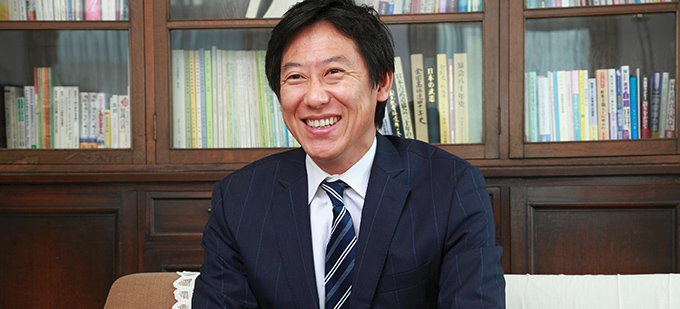Home > Highlighting JAPAN >Highlighting Japan October 2015>Sporting Nation
Highlighting JAPAN

Sporting Nation
Boosting Sport to Energize Japan
An interview with Japan Sports Agency
Commissioner Daichi Suzuki
Commissioner Daichi Suzuki
With Japan poised to host a range of global sporting events, its athletic environment is clearly gain momentum. On October 1 this year, the country established the Japan Sports Agency to promote sports and take a comprehensive approach to its administrative policy. We spoke with Daichi Suzuki, commissioner of the Japan Sports Agency and 1988 Seoul Olympics 100-meter backstroke gold medalist, and asked him about the development of sports policy in Japan, its current approaches, and the global sporting events that Japan will soon be hosting.

Tell us a bit about the development of sports policy in Japan.
The Sports Promotion Act was established in 1961, three years before the 1964 Tokyo Olympics. Over the last fifty-plus years, that law has served as the basis of sports policy. However, as our society changed, people’s needs with respect to sports have expanded and diversified considerably. Other contemporary issues needing attention, such as greater development of parasports, international contributions through sports, and the governance of sports organizations became visible as well.
The Diet therefore held a nonpartisan caucus to deliberate on the trajectory of a new sports law. This resulted in the Basic Act on Sport in 2011. This act goes beyond merely promoting sports, covering all social aspects as well, like the promotion of health through sports, recovery of regional society, the improvement of Japan’s international status and the development of the national economy.
To realize the ideal behind the Basic Act on Sports and take a comprehensive approach to the promotion of sports, an external bureau of the Ministry of Education, Culture, Sports, Science and Technology (MEXT), the Japan Sports Agency, was formed on October 1, 2015.
What is the Japan Sports Agency’s role, and what steps are being taken to make Japan a leader in sports?
In addition to the policies that MEXT has in place to promote sports, each ministry has contributed to advancing sports from its own particular perspective; no single ministry existed to manage all of the policies. The Japan Sports Agency will be charged with creating core policy for sports and promoting that policy, as well as adjusting and regulating the sports-related activities of the other ministries, acting as the control center for the administration’s sports policy.
The Japan Sports Agency will also partner with other ministries to give people opportunities to engage in health-promoting sports by improving sports environments so that people can enjoy sports at each life stage, endeavor to improve sports facilities so that people with disabilities can actively participate in sports, stimulate local communities through sports, and encourage international contributions through sports. Through partnerships with the private sector, the agency will also promote professional sports. We are actively taking these and other policy steps.
Tell us about the global sporting events that Japan will soon be hosting, and your outlook for them.
We believe that major global events like the 2019 Rugby World Cup and the 2020 Tokyo Olympics and Paralympics have the power to vitalize society as a whole, giving people countless dreams and hopes. The Rugby World Cup is slated to take place at twelve cities nationwide, including matches at Kamaishi in Iwate Prefecture, one of the areas stricken by the Great Eastern Japan Earthquake. This is an excellent opportunity to show the world how Japan has rebounded after the earthquake.
In terms of the Olympics and Paralympics, it is vital that this goes beyond one-time sporting events and leaves a lasting legacy for the next generation. We are therefore bolstering the educational curriculum nationwide to spread the idea of peace and human rights through sports. In addition, as promised when we made the Olympic bid, we are taking major action on the Sports for Tomorrow initiative, an international sports-based development program through which we intend to work with over a hundred predominantly developing countries and ten million people over the seven years from 2014 to 2020, sharing the value of sports and the ideals of the Olympic and Paralympic movement.
In the process, we will be working closely with the Olympic Committee and Tokyo metropolitan government as well as the Japan Olympic Committee, Japanese Paralympic Committee and other sporting bodies to achieve an “all-Japan” approach to the success of the event.
© 2009 Cabinet Office, Government of Japan






